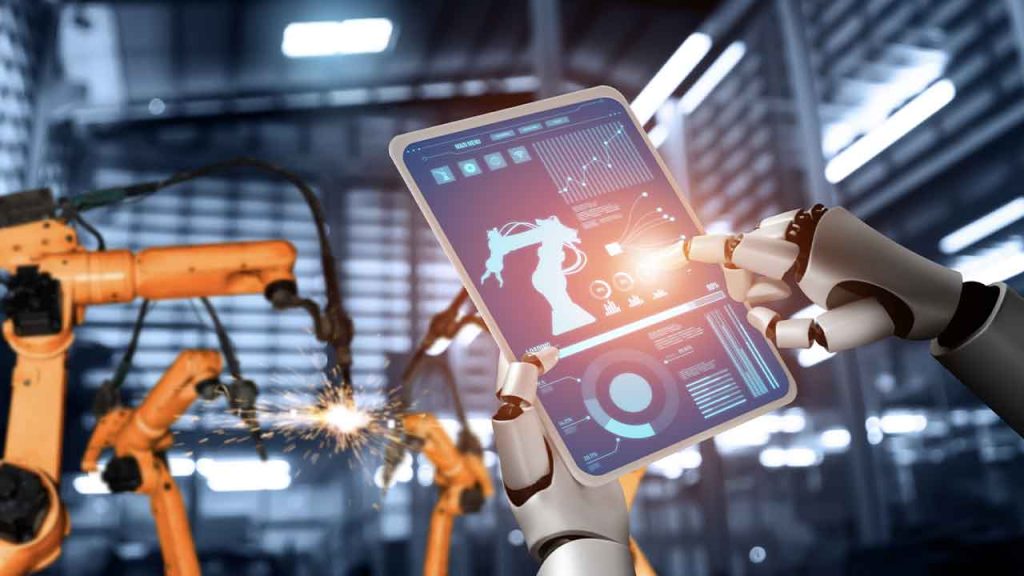The Rise of Industrial AI: Automation Trends to Watch in 2025
Enterprise IoT is forecasted to account for 72% of market revenue by 2028, up from 70% in 2023. This shift highlights how industries are rapidly investing in smarter, connected technologies to drive the next phase of automation.
Automation has long been a part of industry. What’s changing now is the intelligence behind it. Traditional systems followed fixed instructions, but today’s setups use real-time data to adapt, learn, and optimize.
This shift is where AI in industrial automation plays a central role. Intelligent systems detect issues before they cause downtime, predict maintenance needs, and adjust operations on the fly to boost efficiency.
Rather than reacting after problems occur, businesses are moving toward predictive models . Equipment performance, energy usage, and even quality control can now be monitored and adjusted automatically, reducing manual intervention. By turning data into actionable insights, intelligent automation is setting new standards for flexibility, resilience, and smarter decision-making.
As we move deeper into 2025, the fusion of AI with automation technologies promises to redefine productivity standards, cut downtime, and open new possibilities for innovation across industries.
Key Trends Driving the Future of Industrial Automation in 2025
Industrial automation is shifting from simple task execution to intelligent, self-improving systems. Several major trends are now shaping this transformation and setting the pace for the future.
- Intelligent Robotics
Robots are evolving beyond repetitive tasks. Intelligent systems now allow them to navigate dynamic environments, collaborate safely with humans, and adapt to product changes without extensive reprogramming.
- Collaborative Robots (Cobots)
Unlike traditional robots that work separately from humans, cobots are designed to share workspaces and tasks safely. They are becoming more intuitive, easy to program, and flexible for small-batch production, helping manufacturers boost productivity without large-scale infrastructure changes.
- Edge Computing for Real-Time Decisions
Data is increasingly processed at the edge of the network, close to where it is generated. This approach reduces latency, enables faster decision-making, and supports critical operations without the need for constant cloud connectivity.
- Industrial Internet of Things (IIoT) Expansion
More connected devices are entering industrial spaces, providing deeper visibility into operations. With AI analyzing these data streams, organizations can improve asset management, predict maintenance needs, and optimize overall performance.
- Digital Twin Adoption
Virtual replicas of machines and systems help industries simulate performance, predict failures, and optimize operations without physical intervention. Digital twins are becoming essential tools for proactive maintenance and strategic planning.
- AI-Enabled Quality Control
Automated visual inspection systems powered by learning algorithms are transforming quality control. These systems can detect minute defects that human inspectors might miss, ensuring higher product consistency and reducing waste.
- Hyperautomation Initiatives
Combining AI, machine learning, and robotic process automation (RPA) under one strategy, hyperautomation aims to automate as many processes as possible across organizations. This trend is gaining traction for its potential to streamline operations end-to-end.
- Industrial Cybersecurity Enhancements
As automation grows smarter, so do the threats. AI is being embedded into cybersecurity systems to detect anomalies, predict potential breaches, and respond faster to incidents, helping protect critical industrial infrastructure.
How Intelligent Automation Boosts Sustainability and Efficiency
The future of industrial automation isn’t just about speed or cost reduction. Sustainability and responsible resource management are becoming just as important as operational performance. AI technologies are playing a critical role in driving these priorities forward.
- Energy Optimization
Smart automation systems analyze energy consumption patterns in real-time. By identifying inefficiencies and suggesting adjustments, they help industries lower their energy usage without sacrificing output.
- Waste Reduction
Predictive analytics and smart production planning allow manufacturers to minimize material waste. Systems can forecast production needs more accurately, reducing overproduction and optimizing inventory management.
- Carbon Footprint Management
AI helps companies monitor and track their carbon emissions with greater precision. Advanced modeling tools can suggest operational changes that reduce environmental impact while maintaining profitability.
- Process Efficiency Improvements
By continuously learning from operational data, intelligent systems fine-tune manufacturing processes. This results in less downtime, improved quality, and fewer resource-intensive interventions over time.
- Smart Resource Allocation
In logistics and supply chains, AI-powered platforms optimize routes, shipment loads, and warehouse operations. These improvements lead to fewer transportation emissions and better use of materials throughout the production lifecycle.
Preparing for AI Integration in 2025
The benefits of intelligent automation are clear but realizing them requires more than just investing in new technology. Industries must prepare their operations, systems, and workforce to successfully adopt and scale these innovations.
- Workforce Upskilling
Technology is evolving fast, and so must the skills of the workforce. Companies are prioritizing training programs focused on data analysis, machine learning basics, robotics operations, and system integration to build internal expertise.
- Change Management Strategies
Successful AI integration depends on more than technical readiness. It requires a cultural shift. Clear communication, employee engagement, and structured change management plans help ease the transition and ensure teams embrace new ways of working.
- Investing in Scalable Infrastructure
Modernizing legacy systems and investing in flexible, modular infrastructure allows companies to deploy AI solutions more effectively. Cloud platforms, edge computing capabilities, and interoperable systems are becoming critical foundations.
- Data Strategy Development
AI relies heavily on high-quality, real-time data. Industries are building strong data governance frameworks to ensure that the information collected is accurate, secure, and ready for advanced analytics.
- Pilot Programs and Incremental Deployment
Rather than attempting full-scale transformations at once, leading organizations are starting with focused pilot projects. This approach allows them to validate results, adjust strategies, and scale successful solutions systematically.
The Road Ahead: Why Intelligent Automation Is the Future
Industrial automation is entering a new chapter, where flexibility, intelligence, and resilience define success. Smarter systems are not just enhancing production—they are transforming how industries manage resources, make decisions, and plan.
The rise of intelligent automation is helping companies stay competitive in a market shaped by rapid change and increasing environmental expectations. By combining technologies like intelligent robotics, edge computing, and the Industrial Internet of Things, organizations are building operations that are faster, safer, and more sustainable.
Looking ahead to 2025 and beyond, businesses that embrace this evolution will gain a clear advantage. Preparing teams, upgrading infrastructure, and embedding intelligent decision-making into everyday workflows are critical steps to staying ahead of the curve.
The opportunities are enormous for those willing to lead the change. Intelligent automation is no longer a future goal—it’s a present necessity that will shape the next generation of industrial success stories
About the author
 Sanjeev Verma, the CEO of Biz4Group LLC, is a visionary leader passionate about leveraging technology for societal betterment. With a human-centric approach, he pioneers innovative solutions, transforming businesses through AI Development, IoT Development, eCommerce Development, and digital transformation. Sanjeev fosters a culture of growth, driving Biz4Group’s mission toward technological excellence. He’s been a featured author on IBM and TechTarget.
Sanjeev Verma, the CEO of Biz4Group LLC, is a visionary leader passionate about leveraging technology for societal betterment. With a human-centric approach, he pioneers innovative solutions, transforming businesses through AI Development, IoT Development, eCommerce Development, and digital transformation. Sanjeev fosters a culture of growth, driving Biz4Group’s mission toward technological excellence. He’s been a featured author on IBM and TechTarget.
